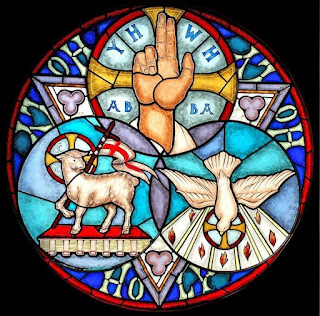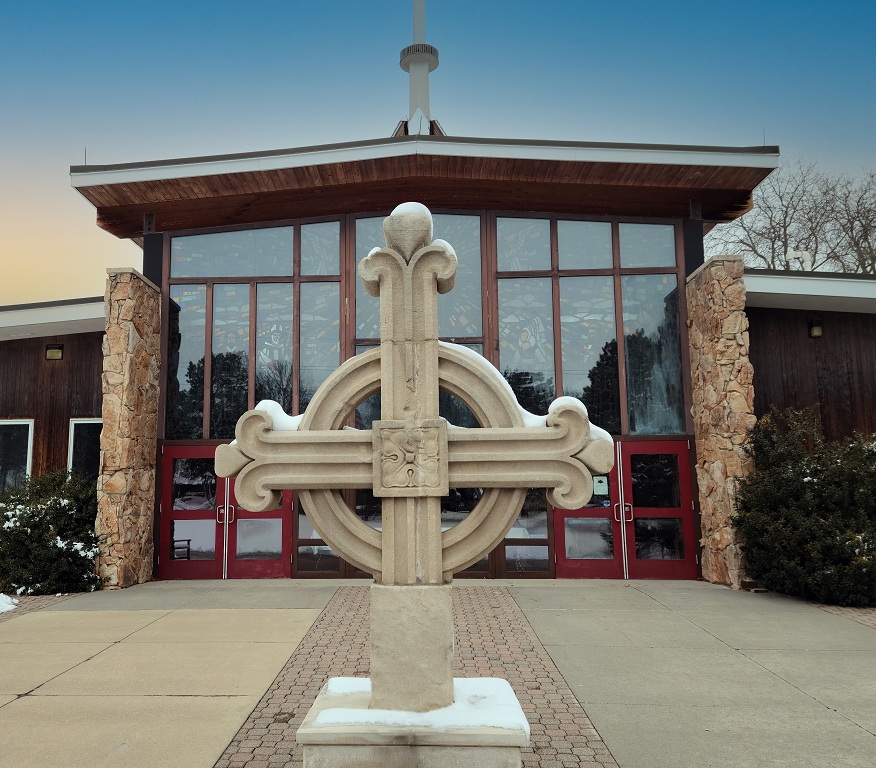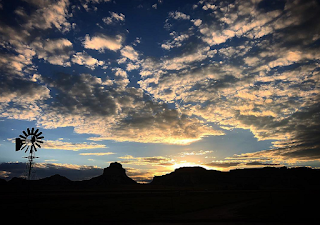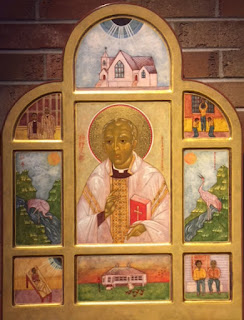Why should we care about the Trinity?
Why does something that can’t be really explained matter so much to our faith? The word “Trinity” doesn’t even show up in Scripture—why should we care? Well, here’s why, according to two great living theologians: as Will Willimon puts it, the Trinity is our best way to tell the story of “God’s rich, relentless love for us.” And Paul Neuchterlein says, “The Trinity is not a logical puzzle for us to solve—the Trinity is God’s Love Story for us to be swept up in.”… God’s love story…let’s explore that a little.
The first person of the Trinity is God the Father: God, the Creator of all, who is not, therefore, a created “being.” God, who is utterly beyond our understanding and our knowing, outside of our time and space. This kind of abstract, distant God has so often been characterized either as that old man with a white beard who is “up there,” far away in heaven—or else, just a sort of cosmic clock-maker God, who set the whole thing in motion and then stepped away. There are some key problems with this kind of distant, vague, God: It’s much too easy for us to either ignore this God, or, much worse, to weaponize this God—to re-make God in our own image for our own purposes. This is the kind of God who has been “useful” to those in power throughout our civil and church history—when we want to attack those who we’ve at various times decided don’t belong,” like our Jewish and Muslim siblings, or Catholics, or Puritans, or those we called heathens whose land and resources and bodies we wanted to take ownership of. This abstract, convenient, distant God has been used much too often to justify and to bless selfish and evil deeds.
But from the beginning of our faith, from start pf the book of Genesis, this caricature doesn’t describe the God of Israel that we worship…not at all. Our God created us, and everything, and everyone, and proclaimed all of creation to be good. Our God is a personal, loving God who breathed the very breath of life into our nostrils and walked with us in the Garden. Over and over again this God who loved the world sent prophets to call us back when we strayed from the way of abundant life, to call us back with a very simple message: “Love God, love your neighbor.” Do justice, love mercy, walk humbly.” “Loose the bonds of injustice, undo the straps of the yoke, let the oppressed go free, share your bread with the hungry, and bring the homeless poor into your house.”…Called to us over and over again…and over and over again we ignored that call.
So what did God, outside of time and space, unknowable, do about this? Did God just turn away let us run amok? No, the God who loves us came to us in a way we could not misunderstand—in the second Person of the Trinity—as one of us. This is the mystery of the Incarnation: in the baby of Bethlehem, God came to us directly…The human who walked, and preached, and healed, and ate with sinners, and welcomed outcasts and drank with despised foreigners, and overturned the money-changers’ tables in the Temple, and told the church leaders they were nothing but whitewashed tombs—this is God. The innocent human victim on the cross, condemned for saying “love your enemies,” and for healing on the Sabbath, and for challenging unjust power structures—this is God. The resurrected Savior who conquered death—this is God. In this human Jesus, the God we tried to keep useful and safe and distant insisted on being present with us face to face—no more, ever, to be just a general principle or a convenient support for our campaigns of power.
Our unknowable God came to us in a way that we could not misunderstand, as the man, Jesus. God said, “Love me with all your heart and soul and mind, and love your neighbor as yourself,” and God showed us this in person as Jesus walked through Palestine and Galilee. God said, “when someone strikes you turn the other cheek,” and God showed us this in person as Jesus stood in Pilate’s courtyard. God said, “Love your enemies and pray for those who persecute you,” and God showed us this in person as Jesus prayed on the Cross. God said, “Greater love has no one that this: that he lay down his life for his friends,” and God showed us this in person as Jesus died for us.
In the Second Person of the Trinity—the Word of God through whom all things came into being at Creation, the Word who became flesh and dwelt among us—we are presented with a God we cannot so easily ignore or use for our own purposes. Here’s Will Willimon again:
In Jesus of Nazareth, God got physical, explicit…and he came too close for comfort for many. Jesus Christ is God in action [here], is God refusing to remain a general idea or a high-sounding principle...God refusing to stay enclosed in God’s own divinity. There’s a reason why many people seem so determined…to render Jesus into a wonderful moral teacher who was a really nice person who enjoyed lilies and was kind to children and to people with disabilities. To point to [an itinerant] Jew from Nazareth who wouldn’t stay confined within our boundaries for God [and who makes demands of us in our daily life]…is a threatening disruption to many people’s idea of a God who stays [safely] put.
God did not send Jesus into the world to condemn it, to have it be burned up so that a few who were righteous could be whisked away into the clouds—God sent Jesus into the world so that the world—this world—this world that God so loves—could be healed and saved. Let me repeat this: the God we tried to keep distant is Love Unbounded, and God loves us, and would not abide our own refusal to be enfolded in that love, and so God became human, and Jesus ate and drank and walked and taught and cried and suffered and died, to demonstrate and prove that Great Love for us and for this world—and then, conquered death and walked and taught and drank and ate again, showing without ambiguity how real eternal and abundant life in God’s new age will be. Last week on Pentecost Jesus told his disciples, “If you have seen me, you have seen the Father.” In Jesus and his Words to us, we see and hear clearly what God’s love for all creation—for everyone—means, and in Jesus and his Words to us we see and hear—if only we will have eyes to see and ears to hear—what the call of God’s Love for everyone demands of us.
As we answer that call of what God’s Love demands of us, as we make our journey toward God’s abundant life, as we participate in Jesus’ work to love and heal and restore the world, we are inspired and guided by the third Person of the Trinity, the Holy Spirit. The Holy Spirit is not some kind of vague force or some psychic energy to be harnessed and used: the Holy Spirit is the driving personality of God-with-us-always, God with us now. It is the convicting, cleansing, guiding, unpredictable, vibrant Holy Spirit that searches us out in our darkness and confusion and sin and pushes us towards God. There are confessions we cannot give, tasks we cannot do, burdens we cannot bear, sacrifices we cannot make, on our own, but we can with the indwelling power and inspiration of the Holy Spirit. On our path of discipleship, the Holy Spirit gives hope when the world offers none, gives sight when the world is dark, gives strength when the world is weak, gives courage when the world is cowardly, gives conviction when the world is corrupt. We heard Paul in today’s reading from Romans: “Suffering produces endurance, and endurance produces character, and character produces hope, and hope does not disappoint us”—why? Not because life is easy, not because it is without pain, but because “God's love has been poured into our hearts through the Holy Spirit that has been given to us.” You and I, I know, have seen the work of the Holy Spirit in our lives; we have seen it at work in others. The Holy Spirit is constantly revealing God to us, sometimes whispering and sometimes shouting, that God’s way of Love is victorious.
I read a quote earlier: “The Trinity is not a logical puzzle for us to solve—the Trinity is God’s Love Story for us to be swept up in.” The next time someone asks you, “What in the world is this ‘Trinity’ thing about?” you can just answer, “Yes—in the world!. The Trinity is about God in the world, active and present.” There is One God: Creator, Redeemer, and Sanctifier: impossibly other and yet at the same time a human who walked with us 2,000 years ago and yet at the same time a driving inspiration and guide this very minute. God is Love Unbounded, and God refuses to have that Love be unrequited—so God came to us from outside of time and space to show us the meaning and power of that Unbounded Love. And God comes to us now, saying, “Join Me in loving, that you, and all of creation, should not be lost but should share even now in the abundant life of God’s new age.” This is why the Trinity matters so much.
My prayer for us this week is one from N.T. Wright: Father almighty, maker of heaven and earth: Set up your kingdom in our midst. Lord Jesus Christ, Son of the living God: Have mercy on me, a sinner. Holy Spirit, breath of the living God: Renew me and all the world. Amen.




Comments
Post a Comment